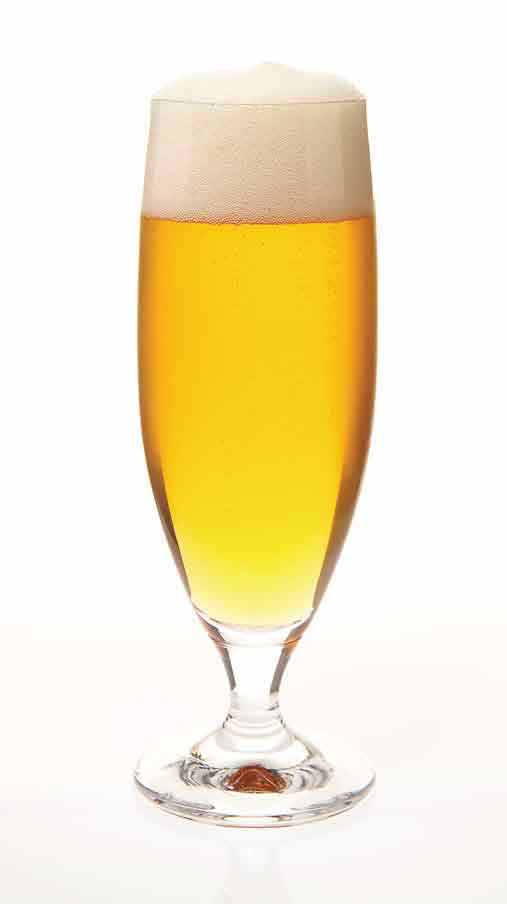Sommerbier
Sommerbier
(5 gallons/19 L, all-grain)
OG = 1.052 FG = 1.011
IBU = 25 SRM = 3 ABV = 5.2%
Late hopped beers don’t need to be hop bombs. This beer that lands somewhere between a German Pilsner and a pale Kellerbier. Served fairly young, this is the perfect summer sipper with a layered hop aroma from the new-school German hops and a bready malt profile with the flaked wheat and dextrin malt providing a moderate mouthfeel.
Ingredients
10 lbs. (4.5 kg) German Pilsner malt
0.66 lb. (300 g) flaked wheat
3.5 oz. (100 g) Carapils® or Carafoam® malt
1 tsp. Irish moss
2.2 AAU Magnum® hops (first wort hops/FWH) (0.14 oz./4 g at 14.5% alpha acids)
1.5 oz. (43 g) Hallertau Blanc hops (0 min.)
1 oz. (28 g) Mandarina Bavaria hops (0 min.)
1.5 oz. (43 g) Perle hops (hopback)
1 oz. (28 g) Hallertau Blanc hops (dry hop)
0.5 oz. (14 g) Mandarina Bavaria hops (dry hop)
White Labs WLP940 (Mexican Lager) or Wyeast 2007 (Pilsen Lager) or SafLager S-189 yeast
2⁄3 cup corn sugar (if priming)
Step by Step
Two days prior to brewday, make an appropriately-sized yeast starter. If using dried yeast, use 2 packets for pitching. A decoction or step mash program would be a great addition to this recipe. I used a single infusion mash though as time was short on this brewday.
Mill the grains and mix with 4 gallons (15 L) of strike water at 163 °F (73 °C) to reach a mash temperature of 150 °F (66 °C). Hold this temperature for 60 minutes. Vorlauf until your runnings are clear. Sparge with enough water to obtain 6.75 gallons (25.5 L) of wort. During the sparge, add the first wort hops to the boil kettle. Bring to a boil and boil for 75 minutes. Add the Irish moss or other kettle fining with 10 minutes remaining in the boil. After the boil, turn off heat and add the flameout hops. Begin a whirlpool of the wort, then let settle for 15 minutes. Filter the beer through a hopback if you have one. If not, you can add the Perle hops as you begin the chilling process. Chill the wort to 52 °F (11 °C). The aim is to have 5.25 gallons (20 L) of wort in your fermenter. Aerate with pure oxygen or filtered air and pitch yeast.
Ferment at 54 °F (12 °C) for 7 days, then increase temperature to 62 °F (17 °C) for three additional days. When no sign of fermentation is noticeable, drop temperature to 45 °F (7 °C) over the course of 5 days. Hold 3 days. Rack onto the dry hops, then wait for three days. Package the beer into a keg or bottle. Carbonate to approximately 2.3 volumes.
Sommerbier
(5 gallons/19 L, partial mash)
OG = 1.052 FG = 1.011
IBU = 25 SRM = 3 ABV = 5.2%
Ingredients
5.2 lbs. (2.4 kg) Pilsen dried malt extract
1 lb. (0.45 kg) Pilsner malt
0.66 lb. (300 g) flaked wheat
1 tsp. Irish moss
2.2 AAU Magnum® hops (first wort hops/FWH) (0.14 oz./4 g at 14.5% alpha acids)
1.5 oz. (43 g) Hallertau Blanc hops (0 min.)
1 oz. (28 g) Mandarina Bavaria hops (0 min.)
1.5 oz. (43 g) Perle hops (hopback)
1 oz. (28 g) Hallertau Blanc hops (dry hop)
0.5 oz. (14 g) Mandarina Bavaria hops (dry hop)
White Labs WLP940 (Mexican Lager) or Wyeast 2007 (Pilsen Lager) or SafLager S-189 yeast
2⁄3 cup corn sugar (if priming)
Step by Step
Heat 1 gallon (3.8 L) of water to 160 °F (71 °C) and remove from heat. Place the crushed Pilsner malt and flaked wheat in a bag and submerge in the water. Try to hold temperature above 150 °F (66 °C), but below 160 °F (71 °C) for 45 minutes. Remove the grain bag and place in a colander. Wash grains with 1 gallon (3.8 L) hot water. Top up to 3 gallons (11 L) or more if possible. Stir in all the dried malt extract and the first wort hops, then bring to a boil. Boil wort for 60 minutes. Add the Irish moss or other kettle fining with 10 minutes remaining in the boil.
After the boil, turn off heat and add the flameout hops. Begin a whirlpool of the wort, then let settle for 15 minutes. Filter the beer through a hopback if you have one. If not, you can add the Perle hops as you begin the chilling process. Chill the wort to 52 °F (11 °C). The aim is to have 5.25 gallons (20 L) of wort in your fermenter, so top off with water if needed. Aerate with pure oxygen or filtered air and pitch yeast.
Follow the fermentation and packaging instructions in the all-grain version of this recipe.
Written by Dave Green

This beer that lands somewhere between a German Pilsner and a pale Kellerbier.


